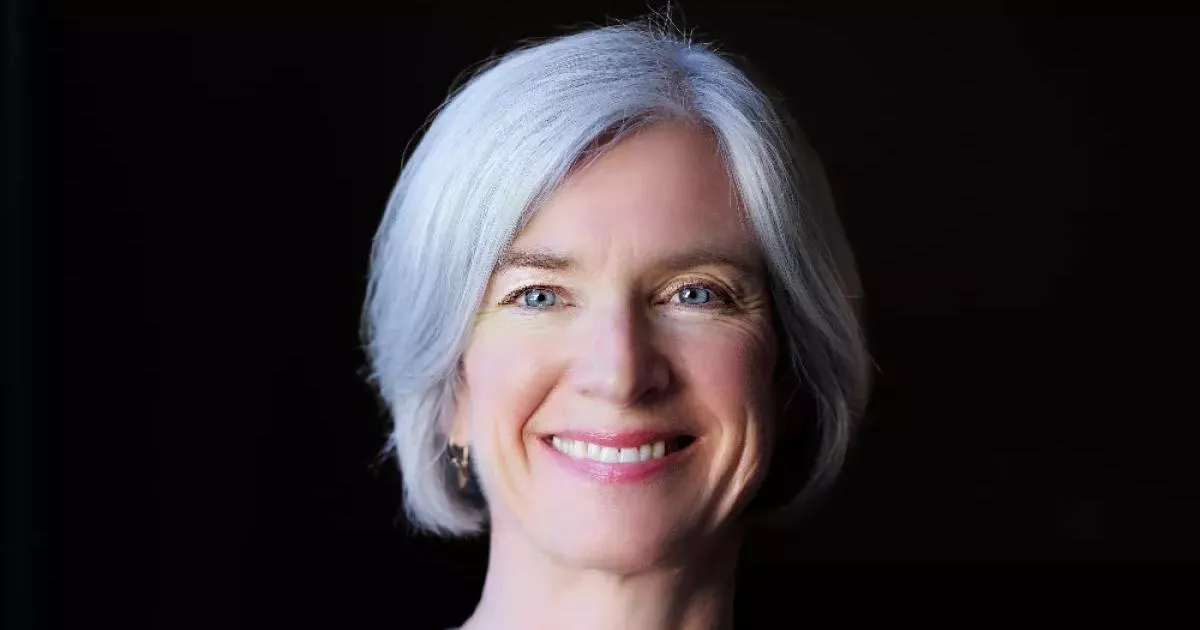Jennifer Doudna is a renowned American biochemist celebrated for her groundbreaking work in CRISPR gene editing, a revolutionary tool with vast potential in genetics and medicine. Her contributions to biochemistry and genetics led her to become one of the first women to receive a Nobel Prize in a scientific field, shared with Emmanuelle Charpentier, in 2020. Doudna holds a prestigious professorship at the University of California, Berkeley, and has been recognized with the esteemed Howard Hughes Medical Institute investigator title since 1997.
February 19, 1964: Jennifer Doudna is born
On February 19, 1964, Jennifer Anne Doudna, a future pioneer in CRISPR gene editing, was born.
1968: Doudna's Interest in DNA Sparked
In 1968, a pivotal moment in Jennifer Doudna's childhood occurred when she received a copy of James Watson's "The Double Helix," a book about the discovery of DNA's structure, further igniting her passion for science.
1981: Doudna Graduates from Hilo High School
In 1981, Jennifer Doudna graduated from Hilo High School, her interest in science nurtured by her chemistry teacher and fueled by her experiences working in a university lab.
1985: Doudna Graduates from Pomona College
Jennifer Doudna earned her Bachelor of Arts degree in biochemistry from Pomona College in 1985, marking the beginning of her journey toward groundbreaking scientific discoveries.
1987: Initial Discovery of CRISPR
The CRISPR system was first discovered in 1987 by Yoshizumi Ishino and colleagues, marking the initial step in understanding this revolutionary technology.
1988: First Marriage
Doudna's first marriage was in 1988 to Tom Griffin, a fellow graduate student at Harvard.
1989: Doudna Completes PhD at Harvard Medical School
In 1989, Jennifer Doudna completed her PhD in Biological Chemistry and Molecular Pharmacology from Harvard Medical School, focusing her dissertation on improving the efficiency of self-replicating catalytic RNA under the supervision of Jack W. Szostak.
1991: Doudna Starts Research on Ribozyme Structure at the University of Colorado Boulder
In 1991, Jennifer Doudna embarked on a research project at the University of Colorado Boulder to crystallize and determine the three-dimensional structure of a ribozyme, aiming to compare it with enzymes (catalytic proteins).
1991: Doudna Begins Postdoctoral Research at the University of Colorado Boulder
Jennifer Doudna began her postdoctoral research at the University of Colorado Boulder in 1991, working alongside Thomas Cech, a prominent figure in the field of RNA research.
1994: Doudna Completes Postdoctoral Research
Jennifer Doudna completed her postdoctoral research in 1994, marking a significant step in her career and setting the stage for her groundbreaking work in the field of genetics.
1994: Doudna Joins Yale University as Assistant Professor
Jennifer Doudna joined Yale University's Department of Molecular Biophysics and Biochemistry as an assistant professor in 1994, marking a significant step in her academic career.
1996: Beckman Young Investigators Award
Doudna received the Beckman Young Investigators Award in 1996.
1996: Doudna Completes Ribozyme Structure Research at Yale University
In 1996, Jennifer Doudna successfully completed her research project at Yale University, uncovering the structure of a ribozyme, a significant achievement in understanding these RNA enzymes.
1997: Doudna becomes a Howard Hughes Medical Institute Investigator
In 1997, Jennifer Doudna's contributions to biochemistry and genetics were recognized with her appointment as an investigator with the Howard Hughes Medical Institute.
2000: Alan T. Waterman Award
Doudna was honored with the Alan T. Waterman Award in 2000 for her work on ribozyme structure determination.
2000: Doudna Becomes Professor at Yale and Visiting Professor at Harvard
In 2000, Jennifer Doudna achieved two significant milestones in her career: she was promoted to the position of Henry Ford II Professor of Molecular Biophysics and Biochemistry at Yale University and was appointed as the Robert Burns Woodward Visiting Professor of Chemistry at Harvard University.
2000: Doudna Receives the Alan T. Waterman Award
In 2000, Jennifer Doudna's research on the structure of ribozymes, determined through X-ray crystallography, earned her the prestigious Alan T. Waterman Award.
2000: Marriage to Jamie Cate
Jennifer Doudna married Jamie Cate, a fellow scientist, in Hawaii in 2000.
2001: Doudna Continues as Visiting Professor at Harvard University
Jennifer Doudna continued her role as the Robert Burns Woodward Visiting Professor of Chemistry at Harvard University in 2001.
2001: Eli Lilly Award in Biological Chemistry
She received the Eli Lilly Award in Biological Chemistry from the American Chemical Society in 2001.
2002: Move to Berkeley
Doudna and Cate moved to Berkeley in 2002 to take up faculty positions at the university.
2002: Doudna Joins Berkeley as Professor
In 2002, Doudna joined the faculty at the University of California, Berkeley, as a professor of biochemistry and molecular biology, marking a significant move in her academic career and providing her with access to the advanced facilities at Lawrence Berkeley National Laboratory for her research.
2002: Elected to the National Academy of Sciences
Jennifer Doudna was elected to the National Academy of Sciences in 2002.
2003: Elected to the American Academy of Arts and Sciences
In 2003, Jennifer Doudna was elected to the American Academy of Arts and Sciences.
2006: Introduction to CRISPR
In 2006, Jennifer Doudna was introduced to CRISPR by Jillian Banfield, who found Doudna through a Google search.
2009: Doudna Takes Leave of Absence, Returns to Berkeley to Focus on CRISPR
In 2009, Jennifer Doudna took a leave of absence from Berkeley to work at Genentech but returned after two months to focus on CRISPR research.
2010: Elected to the National Academy of Medicine
Jennifer Doudna was elected to the National Academy of Medicine in 2010.
2011: Caribou Biosciences Co-founded
Doudna co-founded Caribou Biosciences in 2011 to commercialize CRISPR technology.
2012: CRISPR-Cas9 Breakthrough
In 2012, Jennifer Doudna and her colleagues made a groundbreaking discovery involving the CRISPR-Cas9 system, demonstrating its potential for targeted DNA editing.
2012: Doudna and Charpentier Propose CRISPR-Cas9 for Genome Editing
In a groundbreaking discovery in 2012, Jennifer Doudna and Emmanuelle Charpentier proposed the use of CRISPR-Cas9 for programmable genome editing, marking a pivotal moment in the history of biology and genetics.
September 2013: Editas Medicine Co-founded
Doudna co-founded Editas Medicine with Feng Zhang and others in September 2013 to commercialize CRISPR technology.
June 2014: Departure from Editas Medicine
In June 2014, Doudna left Editas Medicine after facing challenges and disagreements, marking a turning point in her career.
2014: Doudna co-founds the Innovative Genomics Institute
In 2014, Doudna co-founded the Innovative Genomics Institute, aiming to further the development and application of genome editing technology.
2014: Elected to the National Academy of Inventors
In 2014, Jennifer Doudna was elected to the National Academy of Inventors.
September 25, 2015: Royal Society Terms, conditions and policies archived
On September 25, 2015, the "Royal Society Terms, conditions and policies" were archived.
2015: Became a fellow of the American Academy of Microbiology
Along with Emmanuelle Charpentier, Jennifer Doudna became a fellow of the American Academy of Microbiology in 2015.
2015: Breakthrough Prize in Life Sciences
Doudna and Emmanuelle Charpentier were awarded the Breakthrough Prize in Life Sciences in 2015 for their contributions to CRISPR/Cas9 genome editing.
2015: Doudna Receives Breakthrough Prize in Life Sciences
Jennifer Doudna, along with Emmanuelle Charpentier, received the 2015 Breakthrough Prize in Life Sciences for their groundbreaking work on CRISPR-Cas9 genome editing technology.
2015: Named one of the Time 100 most influential people
Jennifer Doudna, along with Emmanuelle Charpentier, was named one of the Time 100 most influential people in 2015.
March 9, 2016: Royal Society Terms, conditions and policies retrieved
The "Royal Society Terms, conditions and policies" were retrieved on March 9, 2016.
2016: Runner-up for Time Person of the Year
Doudna was a runner-up for Time Person of the Year in 2016, alongside other CRISPR researchers.
2016: Elected a Foreign Member of the Royal Society
Doudna was elected a Foreign Member of the Royal Society (ForMemRS) in 2016.
2016: Canada Gairdner International Award
In 2016, Doudna, Charpentier, Feng Zhang, Philippe Horvath, and Rodolphe Barrangou jointly received the Canada Gairdner International Award.
2016: Doudna Wins Gruber Prize in Genetics, Tang Prize, and Canada Gairdner International Award
Jennifer Doudna had a triumphant year in 2016, receiving multiple prestigious awards for her contributions to genetics, including the Gruber Prize in Genetics, the Tang Prize, and the Canada Gairdner International Award.
2017: Mammoth Biosciences Co-founded
Doudna co-founded Mammoth Biosciences, a bioengineering startup, in 2017 with the goal of improving access to biosensing tests.
2017: Publication of "A Crack in Creation"
In 2017, Doudna co-authored "A Crack in Creation: Gene Editing and the Unthinkable Power to Control Evolution," a book for the general public about the CRISPR breakthrough.
2017: Doudna Awarded the Japan Prize
In 2017, Jennifer Doudna received the Japan Prize, adding to her list of accolades for her pioneering work in CRISPR gene editing.
2017: CRISPR Patent Lawsuit Decision
In 2017, the court ruled in favor of the Broad Institute in the CRISPR patent lawsuit, leading to further legal actions and appeals.
2017: Awarded the Golden Plate Award of the American Academy of Achievement
Jennifer Doudna received the Golden Plate Award of the American Academy of Achievement in 2017.
September 2018: CRISPR Patent Dispute Ruling
In September 2018, the appeals court ruled in favor of the Broad Institute's patent for the CRISPR-Cas9 technology, concluding a significant legal battle.
2018: NAS Award in Chemical Sciences
Doudna was honored with the NAS Award in Chemical Sciences in 2018.
2019: Harvey Prize
In 2019, Doudna, Emmanuelle Charpentier, and Feng Zhang were jointly awarded the Harvey Prize.
March 2020: CRISPR-Based COVID-19 Testing Initiative
In March 2020, Doudna led an effort to develop CRISPR-based COVID-19 testing at the Innovative Genomics Institute (IGI), processing over 500,000 patient samples.
2020: Awarded a Guggenheim Fellowship
In 2020, Jennifer Doudna was awarded a Guggenheim Fellowship.
2020: Doudna wins Nobel Prize in Chemistry
In 2020, Jennifer Doudna, along with Emmanuelle Charpentier, was awarded the Nobel Prize in Chemistry for their groundbreaking work in developing the CRISPR-Cas9 genome editing method.
2020: Mammoth Biosciences Funding Round
Mammoth Biosciences raised $45 million in a Series B funding round in 2020.
2021: Received the Award for Excellence in Molecular Diagnostics and appointed to the Pontifical Academy of Sciences
Jennifer Doudna received the Award for Excellence in Molecular Diagnostics from the Association for Molecular Pathology in 2021. In the same year, Pope Francis appointed her as a member of the Pontifical Academy of Sciences, along with two other female Nobel laureates, Donna Strickland and Emmanuelle Charpentier.
2022: Doudna Achieves High h-index
By 2022, Jennifer Doudna's significant contributions to science, particularly her groundbreaking work on CRISPR-Cas9, were reflected in her impressive h-index of 141 on Google Scholar and 111 on Scopus, indicating the impact and influence of her research.
2022: Chief Science Advisor at Sixth Street Partners
Doudna joined Sixth Street Partners as their chief science advisor in 2022 to provide expertise on CRISPR-related investments.
2023: Doudna Continues Work at UC Berkeley and Leads Innovative Genomics Institute
As of 2023, Jennifer Doudna continued her work at the University of California, Berkeley, where she directs the Innovative Genomics Institute, focusing on developing and applying genome editing technology for advancements in human health, agriculture, and climate change.
2023: Doudna Inducted into National Inventors Hall of Fame
In recognition of her revolutionary work on CRISPR gene editing, Jennifer Doudna was inducted into the National Inventors Hall of Fame in 2023.
2023: Received an honorary Doctor of Science degree from Harvard
Jennifer Doudna received an honorary Doctor of Science degree from Harvard in 2023.
Mentioned in this timeline

Pope Francis served as the head of the Catholic Church...

Google LLC is a multinational technology company specializing in online...
California is a U S state on the Pacific Coast...
Japan is an East Asian island country located in the...
Canada is a North American country the second largest in...

Google Search is the dominant web search engine globally developed...
Trending
46 minutes ago Del Taco exits Columbus, Phenix City; Georgia locations close permanently and abruptly

2 hours ago Kindergarten SOS: Staff Shortages, Child Hunger, and Parental Addiction Concerns Rise.
3 hours ago Derrick Jones Jr. scores season-high 22 points; Mathurin leads Clippers over Nuggets.
3 hours ago Delta flight diverted after passenger's alleged attempt to access cockpit, Houston.

3 hours ago Olivia Rodrigo Surprises Young Fan at Talent Show After Pilates Meeting

3 hours ago Nuggets' Championship Hopes Depend on Defense, Not Just Jamal Murray's Health
Popular

Jesse Jackson is an American civil rights activist politician and...
Randall Adam Fine is an American politician a Republican who...

Pam Bondi is an American attorney lobbyist and politician currently...

Bernie Sanders is a prominent American politician currently serving as...

Ken Paxton is an American politician and lawyer serving as...

Barack Obama the th U S President - was the...
